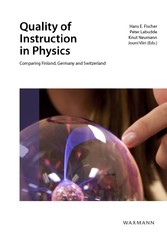Suchen und Finden
Service
Buchtitel
1
Acknowledgements
4
Table of Contents
5
Foreword
7
1. Theoretical Framework
10
Abstract
10
1 Instructional Quality
10
1.1 Instructional Quality and Instructional Outcomes
14
1.2 Covariates of the Effect of Instructional Quality on Instructional Outcomes
16
2 Quality of Instruction in Physics
17
References
21
2. Design of the Study
28
Abstract
28
1 Approaches and Challenges in Research on Instructional Quality
28
2 Research Design and Methodology of the Project
31
2.1 Research Design
32
2.2 Participants
34
2.3 Instruments
40
2.4 Timeline of the QuIP Project
42
References
43
3. Uncovering Country Differences in Physics Content Knowledge and their Interrelations with Motivational Outcomes in a Latent Change Analysis
46
Abstract
46
1 Theoretical Background
46
2 Research Questions
48
3 Method
49
3.1 Sample
49
3.2 Instruments
49
3.3 Data Analysis in a Latent Change Model
51
4 Results
52
4.1 Descriptives
53
4.2 Country Differences Estimated in a Latent Change Model
53
4.3 Effects of the Covariates
54
4.4 Latent Correlations
55
5 Discussion
55
References
58
Appendix
60
4. Surface Level: Teaching Time, Lesson Phases and Types of Interaction
61
Abstract
61
1 Theoretical Background
61
2 Research Questions
63
3 Design and Methods
63
4 Results
65
4.1 Teaching Time
66
4.2 Lesson Phases
66
4.3 Organisation of Classroom Interaction
69
5 Summary and Discussion
71
References
73
Acknowledgements
75
5. A Deeper Look inside Teaching Scripts: Learning Process Orientations in Finland, Germany and Switzerland
76
Abstract
76
1 Theoretical Background
76
2 Research Questions
80
3 Research Design and Methods
80
4 Results
82
5 Conclusion
85
References
86
6. Content and Content Structure of Physics Lessons and Students’ Learning Gains: Comparing Finland, Germany and Switzerland
88
Abstract
88
1 Theoretical Background
88
2 Research Questions
91
3 Methods
91
4 Results
95
5 Discussion and Conclusions
99
References
102
Acknowledgements
103
Appendix
104
7. Practical Work in Physics Instruction: An Opportunity to Learn?
106
Abstract
106
1 Theoretical Background
106
1.1 Practical Work as Context-Oriented Activity
108
1.2 Practical Work as Reflexive Activity
108
1.3 Practical Work as Theory-Driven Activity
108
2 Research Questions
109
3 Design and Methods
109
4 Data Analysis
112
5 Results
114
6 Discussion
118
References
121
8. Enthusiastic Teaching and its Impact on Students’ Interest and Self-Concept: An Investigation of German Physics Classrooms
123
Abstract
123
1 Theoretical Background
123
1.1 Enthusiastic Teaching and its Effects on Student Learning
124
1.2 Effects of Enthusiastic Teaching
125
1.3 Measuring Enthusiastic Teaching
126
2 Research Questions
126
3 Methods
127
3.1 Procedures
127
3.2 Sample
127
3.3 Instruments
127
3.4 Analyses
129
4 Results
130
4.1 Descriptive Results and Preliminary Analyses
130
4.2 Effects of Enthusiastic Teaching on Students’ Self-Concept and Interest
131
5 Discussion and Conclusions
131
5.1 Limitations
132
5.2 Implications for Future Research
132
5.3 The Role of Teacher Enthusiasm in overall Quality of Instruction
133
References
134
9. The Impact of Pedagogical Content Knowledge on Cognitive Activation and Student Learning
138
Abstract
138
1 Theoretical Background
138
2 Research Questions
140
3 Methods
140
3.1 Pedagogical Content Knowledge (PCK) Paper-and-Pencil Test
141
3.2 The Cognitive Activation Coding System
145
4 Results
146
5 Discussion
148
References
150
10. Classroom Management
153
Abstract
153
1 Theoretical Background
153
2 Research Questions
154
3 Instruments and Methods
155
3.1 Structure and Categories of the Rating System: Overview
155
3.2 Description of the Categories
156
3.3 Rating Process
157
3.4 Sample and Rating Unit
158
3.5 Reliability
158
4 Results
159
4.1 Rating of the Categories
159
4.2 Correlations between Classroom Management and other Variables
160
5 Discussion
162
References
163
Appendix
166
11. Constructivist Approaches to Teaching
169
Abstract
169
1 Theoretical Background
169
2 Research Questions
171
3 Instruments and Methods
171
3.1 Structure and Categories of the Rating Instrument: Overview
171
3.2 The Categories and their Facets
172
3.3 Rating on the Basis of a four-point Likert Scale
175
3.4 Sample and Rating Unit
175
3.5 Reliability
175
3.6 Exclusions for Further Analyses
176
4 Results
177
4.1 Exploratory Factor Analysis
177
4.2 Descriptive Overview on the Results and Comparison of the three Country Subsamples
178
4.3 Correlations between Constructivist Approaches and otherVariables
179
5 Discussion
180
5.1 Rating
180
5.2 Extent and Quality of Constructivist Approaches (ResearchQuestions 1 and 2)
181
5.3 Differences between the three
182
5.4 Correlations with Students’ Learning Gain(Research Question 4)
182
6 Outlook
182
References
183
12. Summary and Discussion
185
Abstract
185
1 Summary and Specific Findings of each Book Chapter
185
1.1 Framework of the Project: the Role of our Model
185
1.2 Design of the Study: Pre-Measurement, Video Recording of Lessons, and Post-Measurement in the three Countries
187
1.3 Uncovering Country Differences in Physical Content Knowledge and their Interrelations with Motivation in a Latent Change Analysis
188
1.4 Surface Level: Teaching Time, Lesson Phases and Types of Interaction
189
1.5 Learning Sequences
190
1.6 Content and Content Structure
190
1.7 Practical Work
191
1.8 Enthusiastic Teaching
192
1.9 Pedagogical Content Knowledge and its Impact on Cognitive Activation
193
1.10 Classroom Management
194
1.11 Constructivist Approach to Teaching
195
2 General Findings
196
2.1 New Instruments for International Lesson Analyses inScience Education
196
2.2 Patterns of Physics Instruction in Finland, Germany and Switzerland
198
2.3 Conditions for successful Physics Instruction
199
2.4 Open Questions for further Research
200
3 Further Analyses of our Data
201
3.1 The subtle Role of PCK in Combination with other Variables
201
3.2 Considering the Hierarchical Nature of the Data
202
3.3 Textbooks in Finland and other Countries
202
3.4 Re-thinking the Role of Practical Work in Physics Instruction
203
3.5 Potential Further Research
204
References
205
Alle Preise verstehen sich inklusive der gesetzlichen MwSt.










